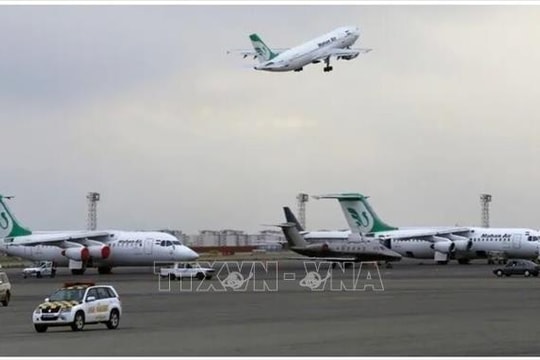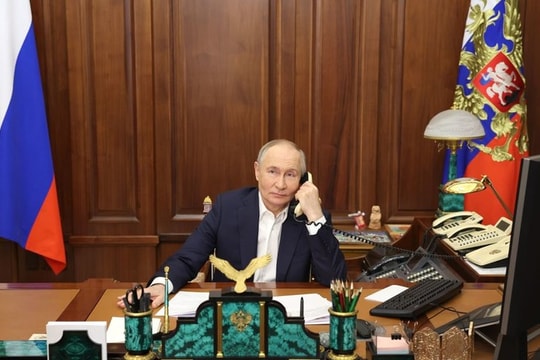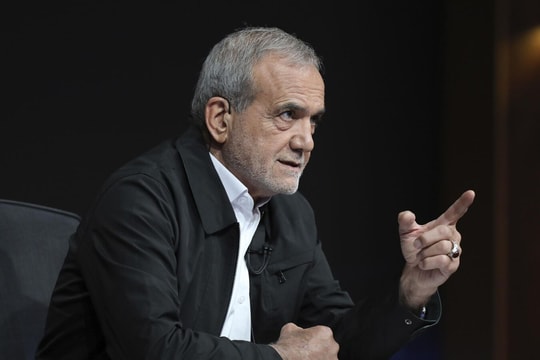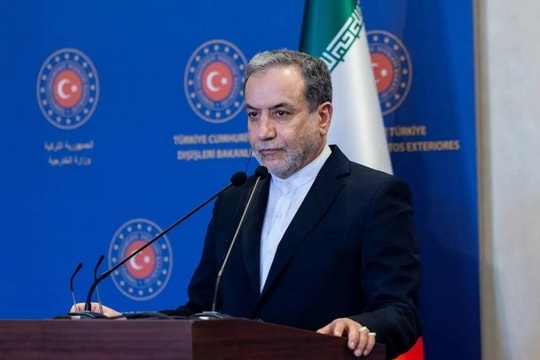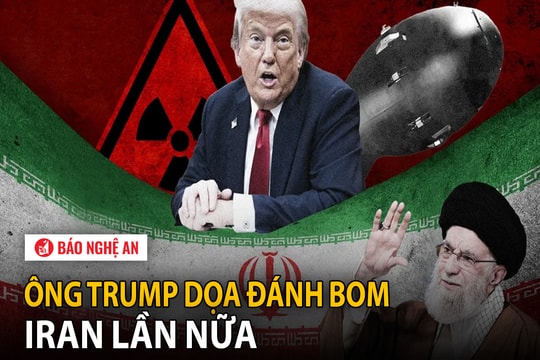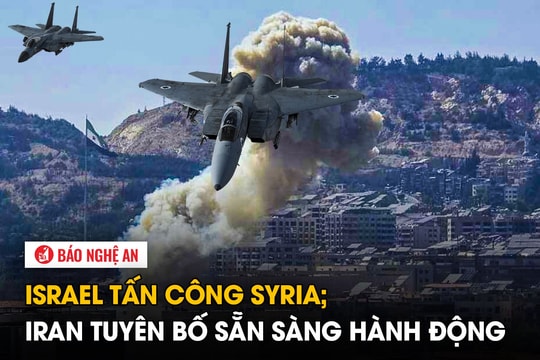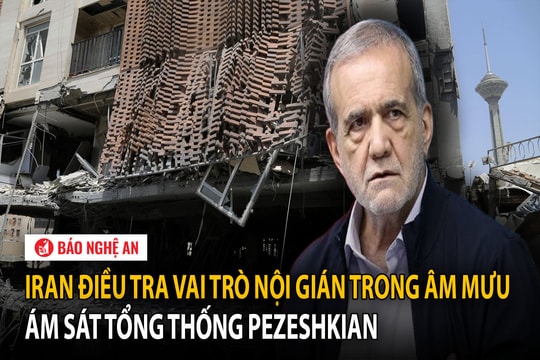Friends and foes in Donald Trump's eyes
In pledging to pursue an “America First” policy, President Donald Trump has shaped a list of countries that are enemies, friends, or both.
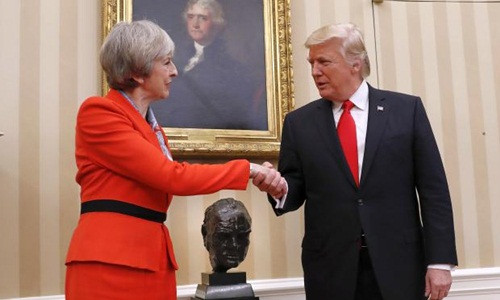 |
| US President Donald Trump shakes hands with British Prime Minister Theresa May in the Oval Office at the White House on January 27. Photo: AP. |
1. Friendly countries
Israel: Israel is a long-standing ally of the United States, but during his tenure, President Barack Obama experienced a stormy relationship with Israeli Prime Minister Benjamin Netanyahu.
Now, Mr. Trump is aiming to restore close ties with the Israeli government, supporting Mr. Netanyahu’s stance on Iran and considering moving the U.S. embassy in Israel from Tel Aviv to Jerusalem, despite Palestinian objections. Trump has also criticized Obama for publicly opposing Israeli settlements on land that could be part of a future Palestinian state.
The new administration has gently criticized Israel for accelerating the pace of settlement construction since Trump took office but has “not taken an official position on settlement construction,” a move that has been different from previous US administrations.
Russia:Every US president since the Cold War has tried to appear friendly early in their term, only to see relations deteriorate later. This was especially true of Mr Obama, who pursued a “reset” with Russia before punishing it for annexing Crimea and accusing Moscow of meddling in US elections.
However, Trump seems to genuinely want to befriend Russia for reasons that are not entirely clear, observers say. He admires and praises Putin as a “strong” leader, and wants to cooperate with Russia to destroy the Islamic State (IS) militants.
He has consistently expressed a pro-Russian stance, questioned the value of the North Atlantic Treaty Organization (NATO), refused to acknowledge allegations that Russian hackers were behind cyberattacks targeting Democrats during the US presidential election and suggested that he might ease sanctions imposed on Moscow.
Trump’s ambassador to the United Nations has condemned Russia for its annexation of Crimea and its failure to stop the violence in eastern Ukraine. But he has not personally criticized Russia for these incidents. Instead, he has recently expressed his respect for his Russian counterpart.
Older brother:The Trump administration has maintained a special alliance with the United States. British Prime Minister Theresa May was the first foreign leader to visit the new US president in Washington, and Trump welcomed Britain’s vote to leave the European Union. Trump sees the anti-EU movement as a populist campaign to restore national sovereignty, similar to the campaign he has waged in the US.
However, Mr. Trump's ban on entry for refugees and citizens from seven Muslim-majority countries is not supported in London, to the point that the Speaker of the British House of Commons has spoken out against Trump speaking to Parliament during his upcoming state visit to the UK because the British people oppose "racism" and support "equality before the law and an independent judiciary".
2. Friendly countries
Australia: Relations with Australia, one of America's closest allies, suddenly hit a storm after a heated phone call between US President Trump and Australian Prime Minister Malcolm Turnbull over an Obama-era agreement that the US would accept 1,250 refugees from detention centers in Australia.
Trump called the agreement requiring the US to accept refugees from countries on the blacklist “absurd.” However, Trump also made it clear that even if he did not approve of the agreement, he would still honor it.
Japan:Officials in Tokyo were upset with Trump’s campaign rhetoric about sharing the cost of security. Trump accused Japan of taking advantage of the United States on trade and not paying enough for the military protection it has enjoyed since signing a mutual defense treaty with the United States after World War II.
After Trump took office, Japanese Prime Minister Shinzo Abe made an emergency visit to Trump Tower in New York to seek Washington's security commitment to Tokyo.
Japan got what it wanted from new US Defense Secretary James Mattis, who visited Tokyo to affirm the US government's "100% commitment" to the US-Japan military alliance treaty. However, the White House boss did not make this commitment publicly.
Virtue:Trump praised Chancellor Angela Merkel as a leader he admired but also harshly criticized her for accepting too many refugees and said the EU was like a "vehicle" for Germany to control power in the region.
For her part, Ms. Merkel stressed that no European country could count on support from a Trump-led America any longer. But she also emerged as the leading defender of the liberal international system that the United States helped establish after World War II.
After Mr. Trump was elected US president, Ms. Merkel pledged to cooperate with the US based on "common values including democracy, freedom, respect for the rule of law as well as the dignity of every human being, regardless of origin, skin color, religion, gender, sexual orientation or political views".
3. Countries that are both friends and enemies
Mexico: From the very beginning of his campaign, Mr. Trump described Mexico as "not our friend" because they "steal" jobs from Americans, dominate the US in bilateral trade balance and push drugs and illegal immigrants across the US border.
He pledged to renegotiate the North American Free Trade Agreement (including the US, Canada and Mexico), and considered the plan to build a wall on the US-Mexico border an important part of his policy agenda.
Trump's insistence that Mexico pay for the border wall has caused the Mexican President to abruptly cancel his planned visit to the US. However, according to analysts, the two neighboring countries still need each other to deal with common issues of trade, security, etc.
China: China’s rapid rise as a superpower has made it a rival to the United States. But in an effort to change China’s trade policies, curb Beijing’s military buildup in the South China Sea and enlist China’s help in countering North Korea’s nuclear program, Trump has taken more aggressive steps than his predecessors.
He threatened to impose steep tariffs on Chinese goods, a move that could spark a trade war between the world’s two largest economies. He also broke long-standing diplomatic protocol by speaking by phone with Taiwanese leader Tsai Ing-wen, much to the dismay of Chinese officials.
So far, Chinese diplomats have responded only with restraint to Trump’s rhetoric. But China’s military has taken more visible steps, such as launching missiles and conducting military exercises in the first weeks of Trump’s presidency.
4. Hostile countries
6 Muslim countries: Syria, Iraq, Libya, Somalia, Sudan, Yemen are 6 of the 7 countries whose citizens are banned from entering the US under the executive order signed by Mr. Trump. Although this order has been suspended, it still shows that Trump sees them as potential enemies, experts assess.
"We must keep 'evil' out of our country!" Trump wrote on Twitter, defending the travel ban, which he saw as a measure to keep out "potential terrorists and others who do not have the best interests of the United States at heart."
Chosen:Before leaving office, Obama reportedly advised Trump that the new administration must make progress on North Korea's nuclear weapons program a national security priority.
Trump, as a presidential candidate, said he was willing to meet directly with North Korean leader Kim Jong-un. However, he dismissed the idea that Pyongyang would soon successfully mount a nuclear warhead on a long-range ballistic missile capable of reaching the United States. "It won't happen!" Trump tweeted, commenting on the notion that North Korea might have a long-range nuclear missile, without specifying how he would ensure that claim.
Iran: Obama ended decades of isolation of Iran in an effort to curb its nuclear program. But Trump appears to be trying to reverse that progress. While he has not explicitly said he wants to scrap the US-Iran nuclear deal, he has imposed sanctions and issued warnings after Iran tested a ballistic missile in late January.
He also placed Iran on the list of seven countries whose citizens are banned from entering the United States. The Trump administration, from the Secretary of Defense, the president's chief strategist, to the president himself, all agree that Iran is a major and present threat.
"We will face difficult days ahead," Iranian Foreign Minister Mohammad Javad Zarif said, referring to the relationship between Washington and Tehran.
According to VNE
| RELATED NEWS |
|---|

